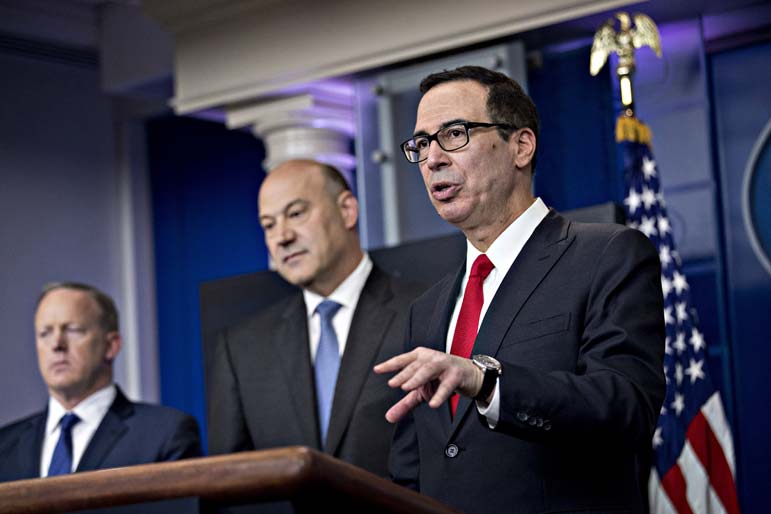 Andrew Harrer for Bloomberg
Andrew Harrer for Bloomberg
Stealing documents off President Donald Trump's desk isn't the only way his top aides are trying to prevent him from taking action on foreign policy. Several administration officials claim that Treasury Secretary Steven Mnuchin has found another way to "resist" the president's maximum-pressure strategy on Iran: simply neglect to give the president a document he requested several weeks ago.
The Trump administration is drastically increasing pressure on Iran, including by tightening the financial noose on the regime and banks it uses to fund malign activities across the Middle East. One key tool Trump is considering is to force Iranian banks off SWIFT, the international system that clears trans-border financial transactions. Banning Iran from SWIFT was a crucial plank of the pressure campaign that brought Tehran to the negotiating table earlier this decade.
Iran rejoined SWIFT in 2016 as part of the nuclear deal that Trump withdrew from this year. Now, other top Trump administration officials and lawmakers want SWIFT to banish Iran again, but Mnuchin and his department are internally opposed to using pressure to force SWIFT to take action, three senior administration officials said.
In interviews, the officials said Mnuchin has been slow-rolling the decision-making process to delay final consideration by the president. Following a July 26 Principals Committee meeting on Iran, the Treasury Department was tasked with producing an options memo laying out possible sanctions on SWIFT, its board members or their banks. Almost two months later, the document is missing in action - which prevents Trump from making a decision.
I reached out to Mnuchin, but a Treasury spokesman declined to comment on specific sanctions measures. The spokesman said, "Secretary Mnuchin has led an intense economic pressure campaign against Iran as part of this administration's comprehensive strategy to address the totality of Iran's malign and destabilizing activity."
That has been largely true until now, but the real pressure is yet to come. In early November, the United States will re-impose harsh sanctions on the Iranian financial system, including the Central Bank of Iran. Although the Obama administration reluctantly implemented the sanctions after the Senate passed them 100 to 0 in 2011, Obama officials later praised them.
Frustrated with the delay, Trump asked officials about progress on the new Iran sanctions during a recent visit to Bedminster, New Jersey, two officials said.
SWIFT banned Iranian banks in 2012 under pressure from Congress and some European governments, but many in Europe were upset by what they saw as U.S. strong-arm tactics. This time, some European governments want to preserve the nuclear deal and protect Iran from new U.S. sanctions. If the United States successfully pressures SWIFT to break ties with Iran again, that will be a huge blow to European efforts.
Knowing this, Germany's foreign minister is calling for the European Union to create an alternative to SWIFT. But that's not going to happen anytime soon. Though the board of SWIFT is based in Belgium and operates under Belgian law, the United States still has huge leverage.
To be sure, it's a controversial strategy with serious risks. The move could further damage already troubled U.S.-Europe relations. Even if SWIFT capitulates, there's no assurance Iran will negotiate. Trump's maximum-pressure strategy may fail.
But we'll never know if that's the case if Trump isn't able to actually implement maximum pressure, said Richard Goldberg, who wrote the original SWIFT sanctions legislation as an aide to Sen. Mark Kirk, R-Ill.
"The only hope for the president's strategy to succeed is getting SWIFT to disconnect all the Iranian banks," he said. "And if the Treasury Department waffles one iota on that mission, they are setting the president up for failure."
There's another great argument for cutting Iranian banks off SWIFT: It would hamper Iran's ability to finance the Assad regime in Syria, Hezbollah, Hamas and their other regional proxies. SWIFT's own bylaws require it to prevent illegal financial activities - such as funding terrorism. Treasury's position is understandable; Wall Street doesn't like Washington policymakers disrupting their institutions, and there could be economic blowback. But allowing Iran to wantonly abuse international financial systems for illicit purposes weakens those systems in the long run.
"Mnuchin's job as treasury secretary is to protect the integrity of the global financial system, and he's not protecting that integrity if he is allowing sanctioned Iranian banks to stay on," said Mark Dubowitz,chief executive of the Foundation for Defense of Democracies.
Senior officials have worked to contain their president by manipulating the policy process for ages. President Jimmy Carter's national security team worked secretly to thwart his stated desire to remove U.S. troops from South Korea. "We began a rear-guard action - delay it, water it down, mitigate the decision as much as possible," Pentagon official Morton Abramowitz said of the effort.
But now, with anonymous officials writing op-eds and senior officials playing hide-and-seek with items on the Resolute Desk, that kind of nonsense has to stop. Mnuchin should make his arguments to the president, give him the information he already requested and let the president decide.
Comment by clicking here.


 Contact The Editor
Contact The Editor
 Articles By This Author
Articles By This Author